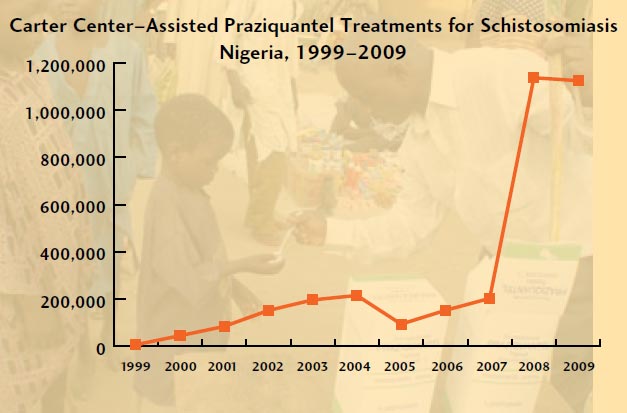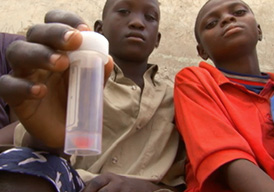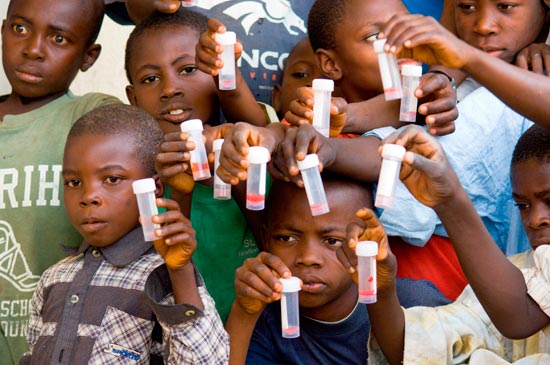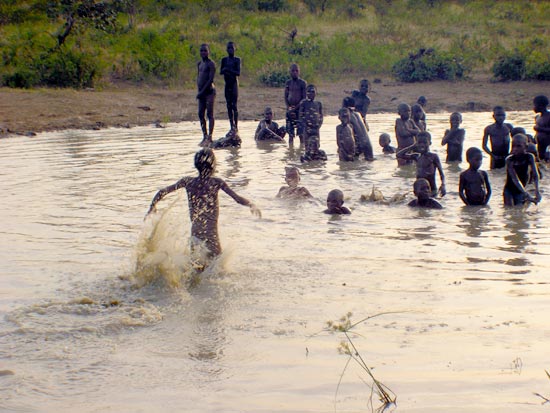In the blistering heat of Nasarawa North, Nigeria, the cool waters of the River Uke beckon all. Women launder clothes, people bathe, girls fetch water, and children, especially boys, splash and swim for fun.
But the enjoyment of the swimming hole comes with a steep price here - red urine, stunted growth, and poor school performance. The river water contains a parasite that bores right through the skin of its victims, wreaking havoc on the bladder and other internal organs and tissue, evidenced through blood in victims' urine.
"We've seen a dramatic decrease in the number of children with blood in their urine, from over 50 percent to now less than 5 percent in the areas
where we work."
-Dr. Frank O. Richards Jr.
School-age children are most susceptible to this disease, called schistosomiasis, probably due to the time they spend playing in the water. On a trip to Nigeria, Dr. Frank O. Richards Jr., director of the Carter Center's schistosomiasis program, pointed out some boys stretching out in the shallow water of a pond. "It's so sad," he said. "Those kids are lying there soaking up the schisto."
More than 200 million people worldwide suffer, and Nigeria has more cases of schistosomiasis than anywhere else. The Carter Center has been fighting a small and targeted but intense war on the disease in the country since 1999 in partnership with the Nigerian government. The disease runs rampant in rural areas without access to sanitation and clean water. When the urine from an infected person, which contains the eggs of the parasite, is passed into water, the eggs hatch and infect snails. The infectious form of the parasite is released from the snails, completing the parasite's life cycle.

Carter Center-Assisted Praziquantel Treatments for Schistosomiasis
Nigeria, 1999-2009
Controlling schistosomiasis is relatively easy. A single oral dose of the drug praziquantel annually reverses up to 90 percent of the damage caused by the disease. As a result of drug administration, "we've seen a dramatic decrease in the number of children with blood in their urine," Dr. Richards said, "from over 50 percent to now less than 5 percent in the areas where we work."
The Center's campaign to control this silent tragedy received a huge boost three years ago when an unprecedented donation of praziquantel was made from German manufacturer Merck KGaA through the World Health Organization, a Carter Center partner. From 2000 through 2007, when the Center had to purchase the medicine at about 8 cents per tablet, an average of 143,000 treatments were provided each year. Following the donation, in 2008, treatments skyrocketed to 1.14 million. The donation pledges 1.8 million tablets to The Carter Center annually for 10 years. The average child needs two tablets per dose.
As long as community life in Nigeria continues to center around local rivers and ponds, its rural citizens will likely face this quiet but heartbreaking disease. And The Carter Center will continue to take advantage of every opportunity to see that the most Nigerians possible reap the benefits that a simple tablet can provide.
Multimedia

Schistosomiasis Control
Watch Video
 All photos: The Carter Center
All photos: The Carter Center
These vials contain the blood-red urine of the children who hold them — evidence that they are infected with schistosomiasis.

Swimming, which is often the only way to cool off from the hot Nigerian sun, exposes children to the parasite that causes schistosomiasis.
Please sign up below for important news about the work of The Carter Center and special event invitations.